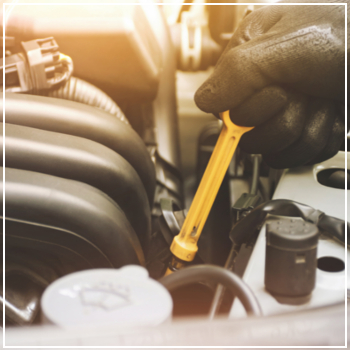 Car owners are advised to check the fluids that keep it running on a regular basis. Delaying oil changes or using low-quality coolant can impact vehicle performance, from how well the engine operates to braking and steering power.
Car owners are advised to check the fluids that keep it running on a regular basis. Delaying oil changes or using low-quality coolant can impact vehicle performance, from how well the engine operates to braking and steering power.
Yet an estimated one-quarter of all vehicles on the road have at least one fluid that needs to be changed or topped off. To better understand the purpose of these fluids and how to check them at home, your vehicle uses the following.
Engine Oil
This fluid helps lubricate engine parts, so they can work together. Without sufficient engine oil, friction causes these parts to rub together and wear out.
It’s recommended to schedule oil changes every 3,000 to 5,000 miles. If you choose to periodically check the oil yourself, make sure your vehicle is parked somewhere level and the engine is cold. The dipstick sits toward the front of the engine or directly behind.
To check the oil level and assess its quality, remove the dipstick and wipe it down with a clean paper towel. Then re-insert and pull it back out to check where the oil hits. The dipstick has “full” and “add” indicators. Ideally, the oil should be close to the “full” line.
Additionally, take this time to assess the color. Engine oil is ideally yellow or amber. A darker hue, sludgy appearance or strange odor can indicate the oil is not doing its job and needs to be changed.
Transmission Fluid
The transmission system powers vehicle movement, transferring the energy generated by the engine to turn the wheels. Transmission fluid is key for its operation. You know it’s running low when your car has difficulty shifting gears or seems to jolt or surge ahead.
Your transmission fluid does not need to be changed as often as the oil. With newer vehicles, you may find yourself doing this every 60,000 to 100,000 miles.
Nevertheless, it’s still a good idea to check the fluid quality and color. Newer transmission fluid has a clear consistency and red hue. Older fluid can develop a brown shade and may have visible particles in the solution.
Coolant or Antifreeze
Coolant helps the engine stay cool in the heat and prevents freezing in the cold. It helps preserve the engine, preventing the formation of corrosion.
Generally, the coolant should be topped off every 50,000 miles. In between, continue to check the quality of the fluid to ensure it hasn’t developed a cloudy or dark appearance, or a leak.
Although you might have heard this “tip”, avoid replacing coolant with water. It might work in a pinch but water can contribute to corrosion, causing deposits to form in the engine and freezing in winter.
Brake Fluid
Similar to the transmission, the brake system has its own dedicated fluid. The pressure of pressing the pedal down causes this fluid to emerge from the brake line to help the pads slow down your car. Generally, the thinner your brake pads become, the less fluid is in the system. Once the pads reach the state minimum, you’ll need to have them replaced and the brake fluid topped off.
Changing the brake fluid can be a challenge. To avoid mixing moisture, dirt and grease into the solution, have a professional inspect and change the fluid for you.
Power Steering Fluid
Power steering fluid helps you turn the steering wheel. When it’s low or absent, the steering wheel can feel stiff and requires more force to turn.
Windshield Washer Fluid
Windshield washer fluid affects how well the wipers perform. Especially if you use your windshield wipers frequently, you’ll need to regularly change the fluid. The reservoir needs to be occasionally topped off, which can be done at home.
Other Fluids
Additional fluids powering your car include:
- Differential Fluid: Also known as gear fluid, this substance helps lubricate the gears located in the front and rear axles, helping your transmission and power steering systems.
- Refrigerant: Different than coolant, refrigerant allows the air conditioning system to continue delivering cool air.
Failing to routinely check, top off or flush vehicle fluids, can result in decreased performance and fuel economy. You risk the need for more repairs or the engine overheating, which increases accident risk. To make an oil change appointment and have other fluids checked, contact our Naugatuck shop today.




